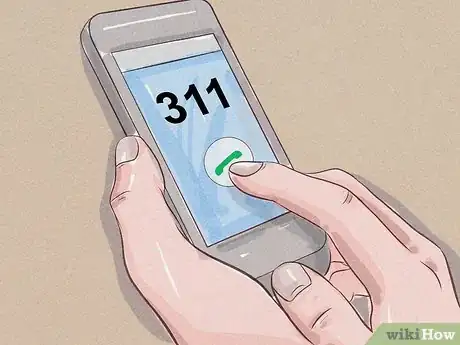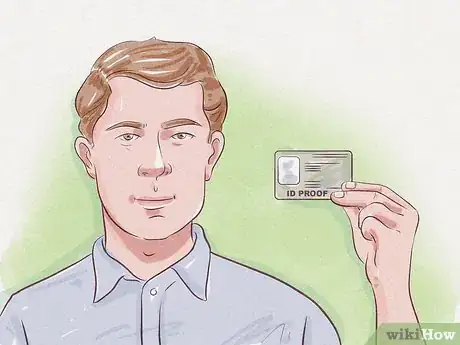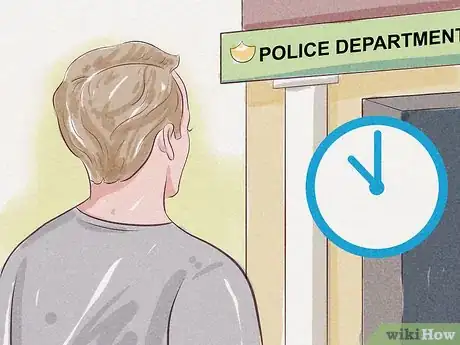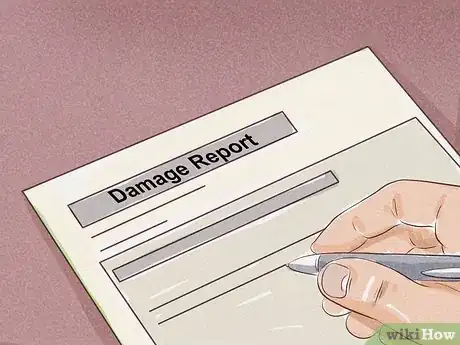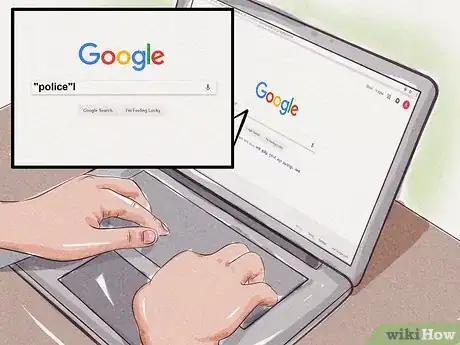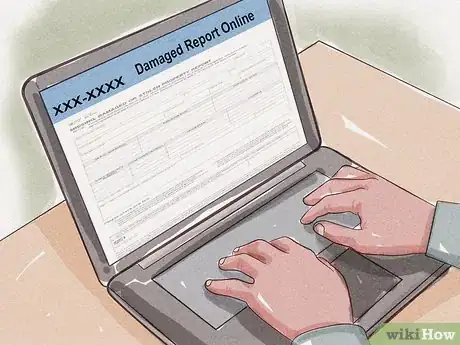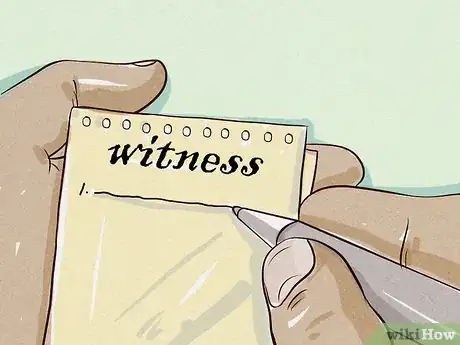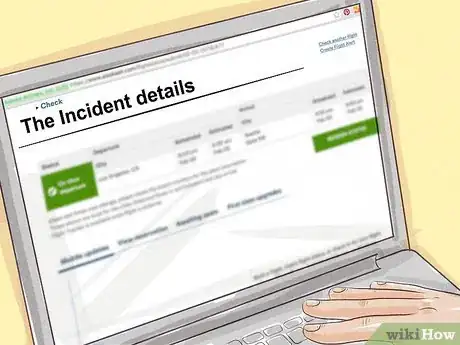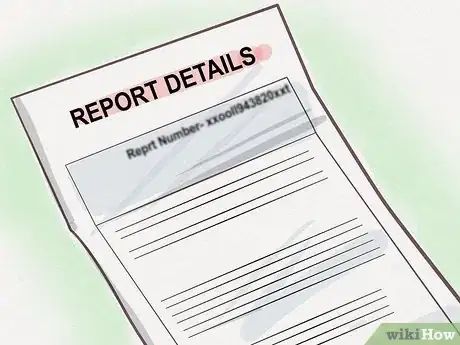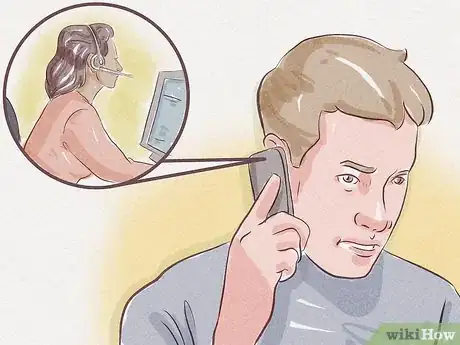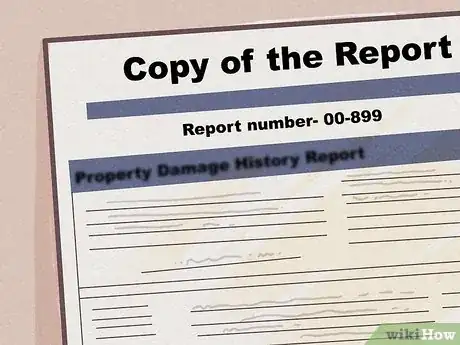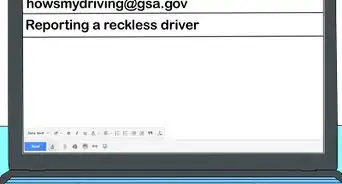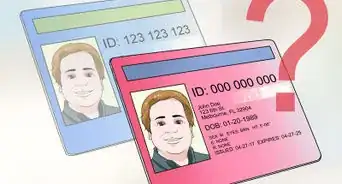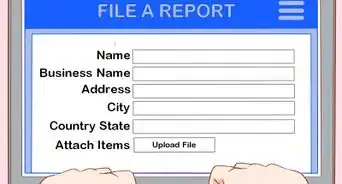This article was written by Saul Jaeger, MS and by wikiHow staff writer, Jennifer Mueller, JD. Saul Jaeger is a Police Officer and Captain of the Mountain View, California Police Department (MVPD). Saul has over 17 years of experience as a patrol officer, field training officer, traffic officer, detective, hostage negotiator, and as the traffic unit’s sergeant and Public Information Officer for the MVPD. At the MVPD, in addition to commanding the Field Operations Division, Saul has also led the Communications Center (dispatch) and the Crisis Negotiation Team. He earned an MS in Emergency Services Management from the California State University, Long Beach in 2008 and a BS in Administration of Justice from the University of Phoenix in 2006. He also earned a Corporate Innovation LEAD Certificate from the Stanford University Graduate School of Business in 2018.
This article has been viewed 347,748 times.
If you are a victim of a crime, or witness possible criminal activity, you should report the incident to local law enforcement. Generally, you can file a police report by visiting the nearest police precinct or calling the non-emergency number for the dispatch office. In some metro areas, you also may be able to file a police report online. If you believe your life or someone else's life is endangered, call 911 immediately.[1]
Steps
Filing a Report in Person
-
1Locate the nearest police department. The police department nearest you, or nearest to the place where the incident occurred, will likely have jurisdiction over the incident. To identify the correct police department, you can search online, or call 311 (information) if that service is available in your area.[2]
- City or metropolitan police departments typically have jurisdiction within the city limits, while the county sheriff's department will have jurisdiction over incidents that take place in the county or outside the city limits.
- There may be dual jurisdiction in some areas, such as if you live in a metro area where city and county governments have been consolidated. In that case, just find the precinct office the shortest distance from you. If you're in the wrong place, they'll tell you where to go.
-
2Gather information about the incident you want to report. When you file a police report in person, you'll typically need information or evidence about the incident itself.[3]
- If you took photos or video on your phone, take your phone with you to the police station. The police typically won't have to confiscate your phone. They can download your photos or video to their computer system.
- In cases of property loss or damage, gather any financial statements, insurance claims, or other documents to take with you.
Advertisement -
3Bring your ID to confirm your identity. When you file your report, you'll need to provide a name and address to the officer who takes your report. A government-issued photo ID serves to prove to the officer that you are who you say you are.[4]
- If your identification has been lost or stolen, bring whatever documents or information you have that might prove your identity. You also might want to bring a friend or relative along to vouch for you.
-
4Visit the police department during regular business hours. Check online or call the police non-emergency line to find out when the precinct office is open. While you typically can file a police report at any time, individual precincts may not be open to the public after business hours.
- Typically you'll have a shorter wait time if you go earlier in the morning, as opposed to in the afternoon.
- If you have been the victim of a crime, such as a break-in or assault, you can also call the police and have them come out to you. In addition to collecting your statement, they will gather evidence. Call the station before you go down there to see if they will come to you.
EXPERT TIPSaul Jaeger is a Police Officer and Captain of the Mountain View, California Police Department (MVPD). Saul has over 17 years of experience as a patrol officer, field training officer, traffic officer, detective, hostage negotiator, and as the traffic unit’s sergeant and Public Information Officer for the MVPD. At the MVPD, in addition to commanding the Field Operations Division, Saul has also led the Communications Center (dispatch) and the Crisis Negotiation Team. He earned an MS in Emergency Services Management from the California State University, Long Beach in 2008 and a BS in Administration of Justice from the University of Phoenix in 2006. He also earned a Corporate Innovation LEAD Certificate from the Stanford University Graduate School of Business in 2018.Police Captain, Mountain View Police Department
 Saul Jaeger, MS
Saul Jaeger, MS
Police Captain, Mountain View Police DepartmentDid You Know? The most common mistake people make when filing a police report is not doing it right away. You never know when a piece of information might be useful to the police in helping them solve a crime or crack a case.
-
5Talk to an officer about the incident. When you enter the precinct, introduce yourself to the desk officer and explain that you want to file a police report. They may take some information from you at that time or give you paperwork to complete while you wait for an available officer.[5]
- When an officer comes to take your report, give them all of the information you know about the incident. Include as many specific details as you know, but stick to the facts.
- If you have any documents or other information, let the officer know. They may want to take your originals or make copies.
- The officer may ask you questions to attempt to get more information about the incident. If you don't know something or don't remember, say so. Avoid making assumptions or engaging in speculation.
-
6Get a copy of the report. When the officer finishes talking to you, they may have a written report available immediately. If the written report isn't ready, they'll give you the report number and let you know when you can pick it up.[6]
- If all you have is the report number, keep it safe. Depending on the type of incident you report, you may need to provide that number to others. For example, if you filed a report for property damage, you may need to provide the police report number to your insurance company when you file a claim.
-
7Follow up on your report within a week. Once your report is filed, it will typically be assigned to an officer, who will begin an investigation. If they uncover any information or identify a suspect, they may be in touch with you.[7]
- If you don't hear from the police within a week, call the non-emergency number and tell the dispatcher that you want to follow up on a report you filed. Give them your report number, and they'll connect you to the appropriate officer who can give you an update.
- You also may learn additional information about the incident after you file your report. If you do, call and ask to speak to the investigating officer. Let them know the additional information.
Filing a Report Online
-
1Find the local police department's website. You typically can find your local police department's website by doing a quick internet search with the word "police" and the name of your city, or the city where the incident occurred.[8]
- Once on the website, look for a link that will allow you to file a police report online.
- Not all police stations will allow you to file a police report online. In that case, you will need to do so in person.
-
2Check the types of reports you can file. From the initial reporting page, the police department typically provides information about the types of incidents you can report online. Make sure your incident fits into one of these categories.[9]
- You shouldn't file an online report for a violent incident or a crime in progress. Call 911 if people's lives are in danger, or call the police non-emergency number.
- Incidents involving lost or stolen property, damaged property, or vandalism typically can be reported online. You also can file an online report for financial crimes, including theft or identity theft.
-
3Gather information before you start your report. Some police departments only allow you a limited amount of time to enter your information before the form resets. Organize anything you'll need before you start to avoid having to start over.[10]
- You may want to write down notes with specific facts and details related to the incident, so you don't have to type in your information off the top of your head. For example, you might write a list of names of others who were involved or who witnessed the incident. You also might make note of the date and time the incident occurred and the street address of the specific location.
- If you have any documents or other files related to the incident, you may be able to upload them along with your report.
-
4Enter your information. In most cases you can't file an anonymous report online. You typically want to provide contact information even if you can. This will allow you to follow up on the report, and police can contact you if they have any questions or information for you.[11]
- Provide an email address and phone number so police can contact you if they have any questions or need additional information to process your report.
-
5Provide details about the incident. Some online report forms may ask for specific details separately, such as the location of the incident and type of incident you're reporting. Then you'll have a field to describe the incident.[12]
- Stick to the facts, including as many specific details as you can remember. Don't include any description of your feelings, emotional reactions, or speculative thoughts.
- The field you have to enter details may be limited to a certain number of characters. Include as many details as possible, but be brief. Make every word count.
-
6Submit and print a copy of the report. When you click submit to send your report, you typically are given the opportunity to print a page that contains the information you submitted. If you're given the opportunity to preview your report before you submit it, look it over for typos or errors.[13]
- If you're not able to print a copy of your report, write down any confirmation number or report number that you're provided. You may need these to follow up on the report later, or to share with an insurance company.
-
7Follow up on your report a couple of days later. When you file a police report online, you typically will hear from the police department within a day or two. They'll let you know if an officer has been assigned to investigate, and any further action you need to take.[14]
- If you don't hear from the police department, call the non-emergency number. Let the dispatcher know that you want to follow up on a police report you filed online.
- Find out the name of the investigating officer, if any, in case you gain new information about the incident and need to update your report.
Filing a Telephone Report
-
1Check if your police station allows telephone reports. Many police stations do not allow telephone reports, as this is a security issue. Since filing a false report is a crime, they need to have the filer sign a document and verify that they are who they say they are.
-
2Call the police dispatch office. Police departments have a non-emergency number that you can call if you want to file a police report over the phone. Do not call 911 unless there is an active crime in progress or people's lives are endangered.
- You typically can find the non-emergency number through an online search, in a telephone book, or by calling 311 (information), if that service is available in your area.
-
3Provide your name and location. Identify yourself to the dispatcher who answers the non-emergency number and let them know that you want to file a police report. They will ask for your name and address, as well as the address of your current location if it differs from your place of residence.[15]
- You may be able to file a report anonymously over the phone. However, if you don't provide your name and contact information, police will not be able to follow up with you about the report.
- You should always provide your name and contact information if you suffered a loss as a result of the incident you're reporting, such as if your property was damaged.
-
4Describe the incident you want to report. Let the dispatcher know what happened, and when and where the incident occurred. Provide as many factual details as you can remember. Remain calm and stick to the facts.[16]
- If you have any photo or video, or documents related to the incident, let the dispatcher know. They will tell you what you need to do with them.
- The dispatcher may ask you some questions if there is specific information they need that you failed to mention in your description.
-
5Meet with an officer if necessary. Once the dispatcher takes your report, they'll determine if the situation necessitates sending an officer to your location to talk to you further. This may happen if, for example, you're reporting damage to your property. If an officer is dispatched, the dispatcher will give you a time frame of when to expect them.[17]
- The officer will confirm the information in your telephone report and ask questions to get any additional information they may need to further investigate your report.
- You may not get a written copy of the report immediately. The officer typically will give you a receipt with the number assigned to your report so you can get a full copy later.
-
6Request a copy of the report. If an officer isn't dispatched to your location to talk to you, ask the dispatcher for a report number. Find out when the full written report will be available and how you can get a copy for your records.
- In some cases, the police department may mail a copy of the report to you. Otherwise, you may need to make a trip to the precinct to pick up your copy.
Warnings
- Filing a false police report is a crime. Make sure you are truthful, and avoid any speculation that might not be accurate.[18]⧼thumbs_response⧽
References
- ↑ https://www.cityofsacramento.org/Police/How-Do-I/File-a-Police-Report
- ↑ https://www.chandlerpd.com/forms/file-report/
- ↑ http://www.dallaspolice.net/division/financialinvestigations/policereport
- ↑ http://www.dallaspolice.net/division/financialinvestigations/policereport
- ↑ https://www.chandlerpd.com/forms/file-report/
- ↑ https://www.chandlerpd.com/forms/file-report/
- ↑ https://www.chandlerpd.com/forms/file-report/
- ↑ https://www.cityofsacramento.org/Police/How-Do-I/File-a-Police-Report
- ↑ http://www.cityoforlando.net/police/selfonline-reporting/
- ↑ https://www.cityofsacramento.org/Police/How-Do-I/File-a-Police-Report
- ↑ http://www.cityoforlando.net/police/selfonline-reporting/
- ↑ https://www.cityofsacramento.org/Police/How-Do-I/File-a-Police-Report
- ↑ https://www.cityofsacramento.org/Police/How-Do-I/File-a-Police-Report
- ↑ http://www.cityoforlando.net/police/selfonline-reporting/
- ↑ http://www.co.washington.or.us/Sheriff/OtherServices/PoliceReports/how-to-file-a-police-report.cfm
- ↑ http://www.co.washington.or.us/Sheriff/OtherServices/PoliceReports/how-to-file-a-police-report.cfm
- ↑ http://www.co.washington.or.us/Sheriff/OtherServices/PoliceReports/how-to-file-a-police-report.cfm
- ↑ https://www.cityofsacramento.org/Police/How-Do-I/File-a-Police-Report
About This Article
To file a police report online, visit your local police department’s website and follow the prompts to fill in the report with specific information, like names and dates. You can also file a report in person by going to your local police department during business hours. Make sure to have your ID and any important information relating to your report, like photos or paperwork. To file a report over the phone, use 311 to find your local non-emergency number and describe the incident to the dispatcher. For more tips on filing a police report from our Legal reviewer, like how to follow up on your report, read on!
